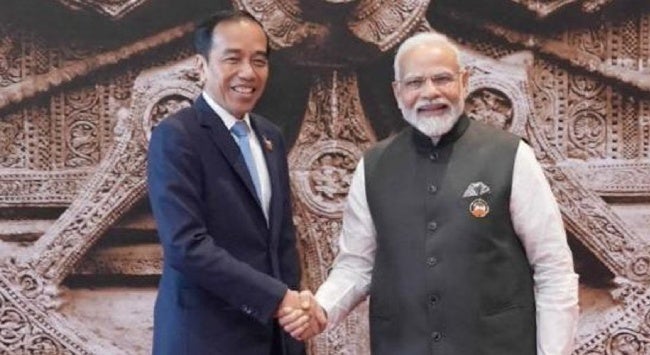Summary
India and Indonesia are two Asian powers whose economic futures look optimistic. Yet, opportunities for further cooperation between New Delhi and Jakarta have not been fully explored or realised for various reasons.
The year 2024 marks the 75th anniversary of relations between India and Indonesia, a historic juncture for two rising Asian powers, populous Asian democracies and multi-ethnic pluralistic societies. The stage is set for deepening ties after decades of diffident and tepid relations. Both countries share an oceanic landscape with the southern tip of the Andamans located 100 kilometres northwest of Indonesia’s Aceh province. Both countries have highly adept digitised states with thriving economies and are led by strong leaders and bureaucracies looking to address an array of mutual challenges like climate change, cybersecurity, protectionism and maritime security, among others.
Historically, Jakarta and New Delhi shared fundamental foreign policy tenets as decolonising developing countries locked in the Cold War. India and Indonesia were the leading members of the Non-Aligned Movement across Asia with Jawaharlal Nehru and Soekarno finding common grounds on existential security issues. The apex was the Bandung Conference in 1955 but that impulse did not sustain. India’s support for communist Vietnam and the Soviet Union in the 1960s roiled domestic perceptions toward New Delhi in Indonesia, slowing down relations. Divisions over China also become palpable since 1962. Jakarta also supported Pakistan in the 1965 Indo-Pakistan war. Ties gradually picked up from the 1990s as the Indian economy liberalised and its focus towards Southeast Asia crystallised through the ‘Look East’ policy.
Since the mid-2000s establishment of a strategic partnership, India-Indonesia relations have found a new logic and trajectory, supported by new levels of trust and understanding, growing shared interests and the mutual desire to work together on issues – bilateral and regional – that are central to their security and economic growth. There appears to be a premium now to expand cooperation to boost bilateral trade and investment, promote sustainable development of marine resources, build disaster risk management cooperation, foster tourism and cultural exchange and strengthen digital and technological links between firms. These issues acquire heightened attention in a climate of intense security competition and economic fragmentation. Jakarta and New Delhi are manoeuvring with security tensions opening new vistas for cooperation. Both Indonesia and India share similar visions for an inclusive, free, rules-based and stable Indo-Pacific, supporting the centrality of the Association of Southeast Asian Nations.
Climate change is a critical shared interest. Opportunities appear endless as both countries confront adverse climate threats and risks. Jakarta is looking for options and support to deepen its energy transition, particularly through renewables like wind and solar where India has a professed capacity and advantage; Indonesia also has significant solar photovoltaic and wind resources that can be massively scaled up. In 2022, Indonesia signed a US$20 billion (S$27 billion) Just Energy Transition Partnership to help reduce fossil-fuel dependency and increase the use of renewables. Both countries are also heavily dependent on agriculture which is extremely climate vulnerable. Both have net zero pledges that are a few decades away (India 2070 and Indonesia 2060), but that pathway allows for the prioritisation of specific projects like carbon capture storage, geo-engineering, critical minerals processing for electric vehicles, biofuels and renewables, electrification and adapting from coal-based energy sources and economies.
Tied to climate change are the opportunities opening on the blue economy front between India and Indonesia. These refer to economic activities and opportunities associated with the oceans and seas and how to unlock cooperation to ensure the sustainable use of ocean resources to benefit economies and livelihoods. Indonesia is a pioneer in this area with a keen intent to leverage its rich maritime space and resources to drive sustainable economic growth. There is now considerable potential to cooperate and share practices and information between India and Indonesia on issues like marine pollution, overfishing, sea agriculture and farming, maritime security management, waste, blue carbon spaces and using the sea and marine resources to generate fuel and food. One key aspect under the rubric of the blue economy is to better understand and empower local actors such that they have the technologies, financing and awareness to protect and unlock ocean landscapes for economic purposes. An immediate imperative for both countries is to explore the harmonisation of blue economy standards and rules that facilitate cross-border collaboration on this issue.
Finally, digital and technology issues are a vital strategic space and issue for further cooperation. Unlike a number of their neighbours, India and Indonesia are heavily digitalised. Both countries have states that are using technology and digital platforms to organise and provide public services; and both countries have instilled a ‘start-up’ attitude to public digital services with e-governance. Going forward, India’s record and accomplishments in using digital public infrastructures (DPI) can extend to countries like Indonesia that are experimenting with different forms of DPIs themselves. One area that is ripe for further discussion is cybersecurity for DPIs as both countries increasingly mobilise and mount public services on digital infrastructures that make them susceptible to new forms of security risks.
The future looks bright for India and Indonesia if they can clinch and build on such opportunities in such formative strategic areas. It is not just their bilateral relationship that stands to benefit but also the whole Indo-Pacific.
. . . . .
Dr Karthik Nachiappan is a Research Fellow at the Institute of South Asian Studies (ISAS), an autonomous research institute at the National University of Singapore (NUS). He can be contacted at isaskn@nus.edu.sg. The author bears full responsibility for the facts cited and opinions expressed in this paper.
Pic:
https://twitter.com/IndianEmbJkt/header_photo
https://twitter.com/SIDMIndia/status/1785701479653007851/photo/1
https://twitter.com/badri_nath12/status/1786261490296660337/photo/1
-
 More From :
More From :
-
 Tags :
Tags :
-
 Download PDF
Download PDF



